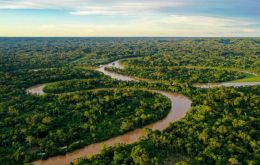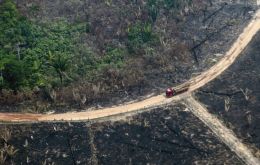MercoPress. South Atlantic News Agency
Tag: deforestation
-
Tuesday, February 24th 2026 - 12:05 UTC
Colombia brings 12 Mexican Mennonites to trial over deforestation

Colombia’s prosecutor’s office is taking 12 Mexican Mennonites to trial over alleged deforestation of more than 100 hectares in rural Puerto Gaitán, Meta province, tied to agricultural land development carried out between 2016 and 2021.
Add your comment! -
Friday, August 8th 2025 - 09:20 UTC
Deforestation drops in Cerrado but grows in Amazon

Over the past 12 months, deforestation in Brazil’s Cerrado biome dropped by 20%, while the Amazon saw a 4% rise in alerts. In the Amazon, alerts covered 4,495 square kilometers—up from 4,321 km² in the previous period. Despite the uptick, this figure represents the second-lowest level recorded in the historical data series.
-
Saturday, May 31st 2025 - 10:55 UTC
Argentina objects to EU's deforestation “standard” risk rating

Argentina has formally objected to the European Union's preliminary classification of the country as a “standard risk” under the EU Deforestation-Free Regulation (EUDR). The regulation, set to take effect in 2026, aims to ensure that consumer products imported into the EU, such as soybeans, beef, timber, and cocoa, do not originate from deforested areas after December 31, 2020.
-
Friday, December 6th 2024 - 10:00 UTC
Relief in Brazil, EU negotiators agree to delay anti-deforestation bill until end of 2025

The implementation of the European Union Deforestation Regulation bill has been postponed until the end of 2025, following a provisional political agreement this week, between the European Parliament and the European Council.
-
Saturday, January 6th 2024 - 16:01 UTC
Significant drop in Amazon deforestation reported in Brazil

Deforestation alerts in the Amazon fell by 50% in 2023, according to a report from the Deter system released Friday by Brazil's National Space Research Institute (INPE), with data collected until Dec. 29 in an area of 5,152 km². It was the lowest rate since 2018, it also explained. In 2022, the alerts had registered 10,278 km² of deforested areas, the highest level ever.
-
Friday, November 10th 2023 - 09:55 UTC
Drop in deforestation of Brazilian Amazon reported

A new study showing a 22.3% drop in the deforestation of the Brazilian Amazon was released Thursday, Agencia Brasil reported. The document also highlighted that the latest figures represented the best results in the matter since 2019.
-
Tuesday, August 8th 2023 - 10:19 UTC
Regional leaders convening in Brazil to prevent rainforest destruction

Leaders from Bolivia, Brazil, Colombia, Ecuador, Guyana, Peru, Suriname, and Venezuela, which make up the Amazon Cooperation Treaty Organization (ACTO) are to convene Tuesday and Wednesday in Belém, the capital of the Brazilian state of Pará to discuss a new development model to put an end to the cycle of destruction that is devastating the largest tropical forest on the planet.
-
Monday, August 7th 2023 - 10:55 UTC
Study shows Brazil needs some US$47bn to recover forests

According to Instituto Escolhas, a Brazilian organization promoting sustainable development, South America's largest country will have to invest US$ 47 billion to recover a large area of forests in the country's six biomes, which would result in employment generation, food production, and a reduction of carbon emissions among other advantages.
-
Friday, July 7th 2023 - 10:38 UTC
Amazon deforestation drops 33.6% in first semester of 2023

Brazil's Real-Time Deforestation Detection System (Deter), of the National Institute for Space Research (INPE), reported Thursday that deforestation in the Amazon in the first semester of 2023 had decreased by 33.6 % year on year and 41 % in the last 12 months.
-
Wednesday, June 28th 2023 - 10:53 UTC
Brazil tops list of deforestation-hit countries, study shows

According to a survey released Tuesday by Global Forest Watch (GFW), a forest monitoring platform developed by the University of Maryland, Brazil has lost 1.8 million hectares of primary rainforests, mostly in the Amazon, a 15% increase between 2021 and 2022, thus topping the list of nations in such a situation, followed by the Republic of Congo, Bolivia, Indonesia, and Peru.
